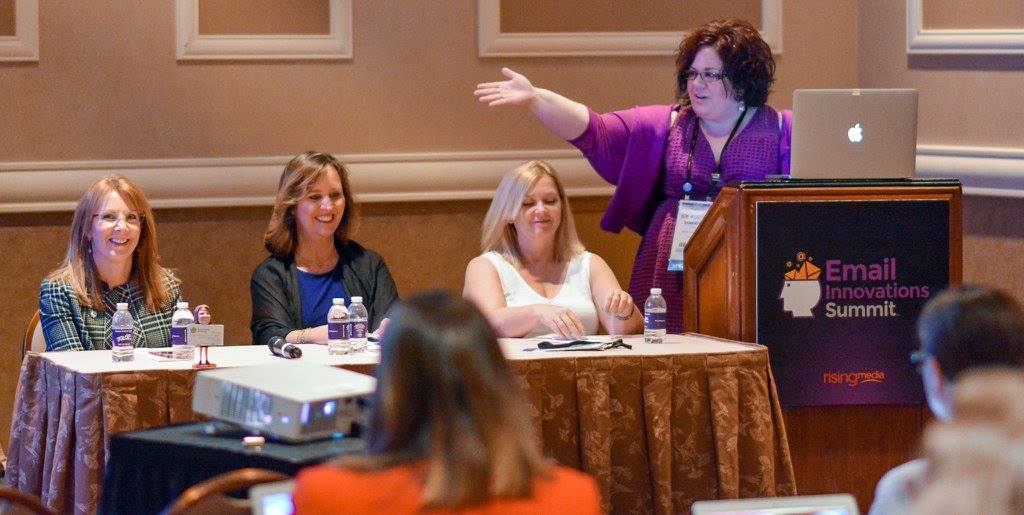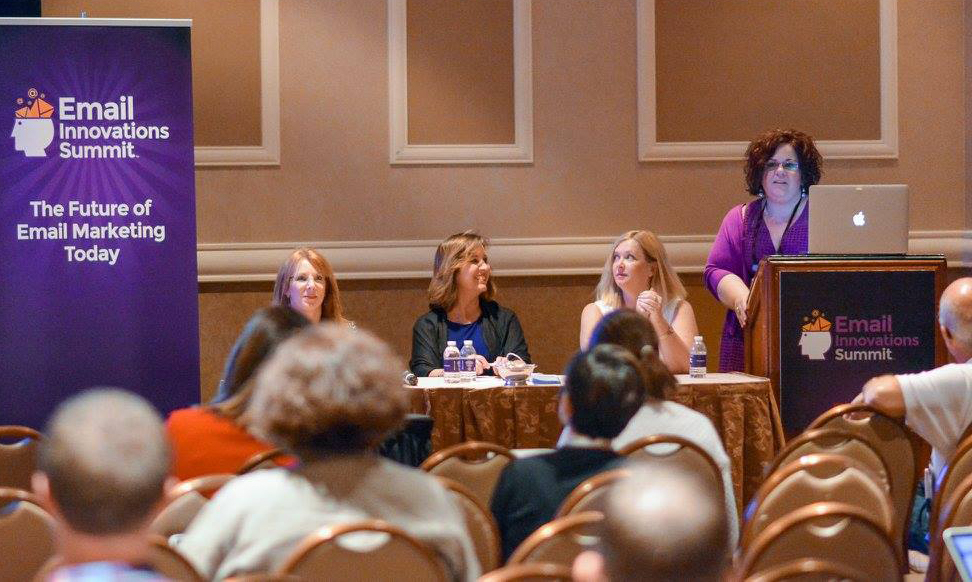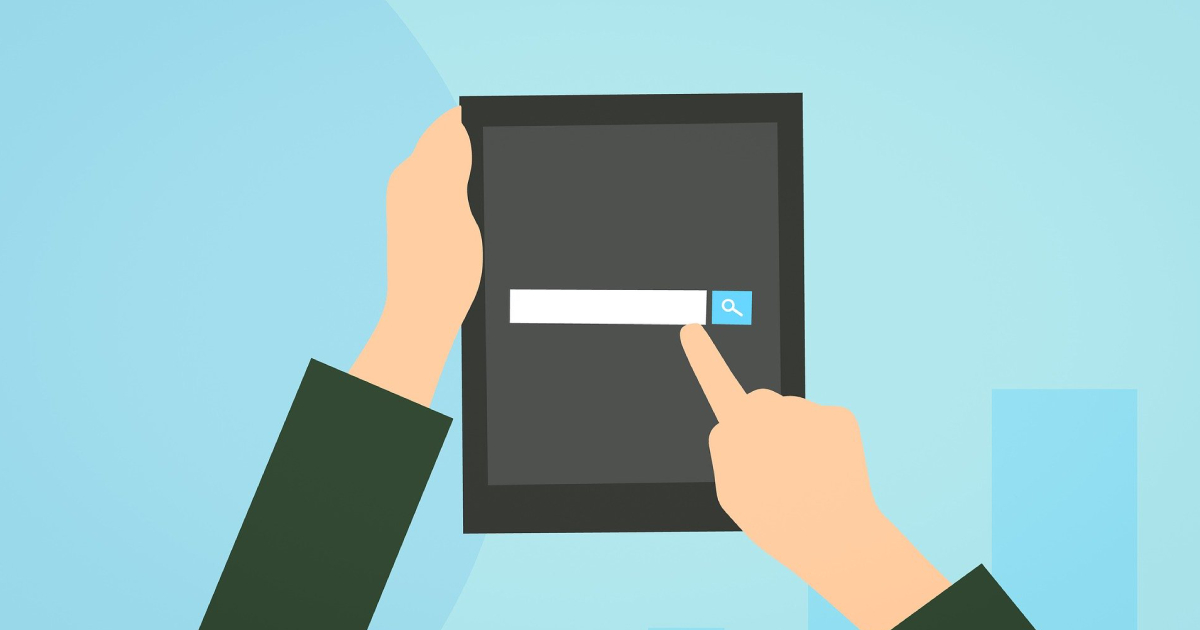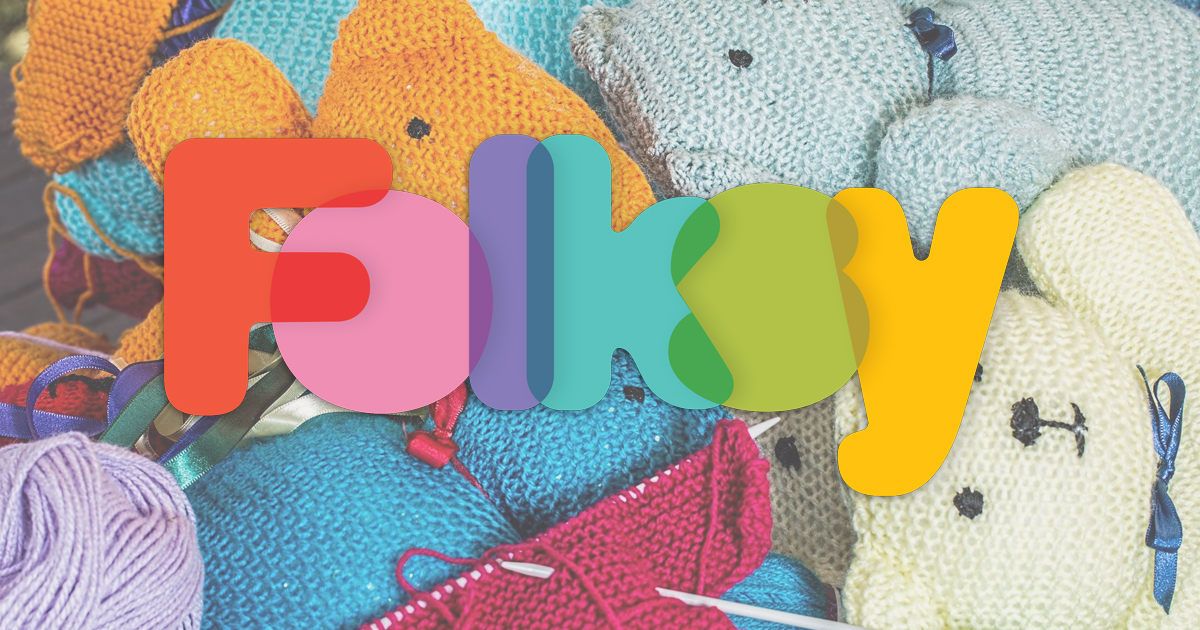The stages and speaking panels of email marketing conferences have long been a lonely place for women. Rewind a decade and there were just a few trailblazing women making a name for themselves as speakers.
One of those women was industry veteran and email marketing expert, Jeanne Jennings. With a long and illustrious career, Jeanne is considered an industry influencer and is involved in some of email’s best known communities.
Ahead of this year’s International Women’s Day, I spoke to Jeanne about gender diversity and getting more women on stage.
As an email marketing strategy consultant, have you ever faced any challenges in terms of gender stereotypes during your career?
I think as women, we face challenges in the work space that men just don’t seem to face. When I was coming up, it was just sort of something that you dealt with, and you had tools for dealing with it.
It’s good that the expectation now has changed. You’re saying, “nope, that shouldn’t happen”. We’ve all faced things in our careers that are less likely to happen to men. I had a boss who suggested that I express my ideas in terms of a question, rather than a recommendation – I didn’t stay in that job very long! Maybe these experiences happen to men sometimes but I don’t think they happen as much.
Have you ever had to deal with men not taking you seriously in your role?
Early in my career, I had some of that. I remember probably around 2001, I spoke at a conference. I’d been working in the online space since 1989 – I started my career with CompuServe – so my bio said that I had over 10 years of experience. And a man in the audience challenged me on that, in front of all the conference attendees. He said “First of all, online hasn’t been around for 10 years. And second of all, you’re not old enough to have been doing this for 10 years”.
That stuff doesn’t happen much anymore, probably because I’m somewhat well-known in the industry. Now I kind of think it’s funny when people don’t take me seriously or challenge my knowledge. When people are rude like that, it says more about them then it does about me or my expertise.

You’re the chair of the Email Innovations Summit in Las Vegas this year – have you had difficulty sourcing women to speak? If so, what do you think are the challenges there for women?
Oh, goodness, no, I’ve not had any challenges sourcing women to speak. For the Email Innovation Summit I decided who I wanted for my four keynotes and I approached them to speak. It turns out, two of them are men and two of them are women. It just happened that way. I didn’t try to plan it.
They’re the best people to talk about the topics that we wanted to have discussed. I haven’t looked at the agenda, but off the top of my head, I can think of a lot of women in there that are speaking.
I think that women need to focus on putting themselves out there to speak. For instance, for a lot of conferences you submit a proposal. I’ve worked on conference committees where the submissions were overwhelmingly by men and we just didn’t have women submitting to speak. For those conferences, it’s hard because you’re kind of working with what you’ve got.
I’ve been thrilled to see more women in recent years submitting to these conferences to speak. I think that imposter syndrome, and confidence levels and things like that play into women not stepping up to speak.
One of the things I remember from the 90s, I was at a conference with a colleague and he happened to be a man and we were sitting in a session. And the topic was a certain kind of marketing tactic. And the gentleman on the stage was touting the fact that he got, I think it was a 4% response rate. My colleague next to me leans toward me and he says, ‘Jeanne, didn’t you do that, like three months ago, and you got a 7% response rate?’ And I said, ‘I did’. And he looks at me and he’s like “why aren’t you up there talking about this? Why are we listening to him?”.
And I remember thinking in my head, why aren’t I up there? Why didn’t I submit to speak at this conference? I was so focused on getting the work done. Do you know what I mean? So at that point, I actually started submitting to speak at conferences, and it kind of took off from there, but I think that women need to think about getting themselves out there.
So many of us are focused on doing a good job at our job, that we don’t think about doing a good job for our career, which means writing and speaking and getting the word out and networking – even if you’re a shy person and you don’t want to speak in front of a crowd. You can write an article, you can go to a networking event and just talk to people. I think that’s one of the things that was always missing. I think women did less of that than men. But I think that’s changed a lot in the last couple years.
What do you think has prompted that change?
I think it’s an awareness. And things like Women of Email can be good in that way. A couple years ago, I got an invitation to speak at a conference and WoE was rather new. I actually reached out to one of the women I’d met there and invited her to speak with me. And so that was her first speaking gig. And we did it together. So I think that’s really helped – organisations like that help.
I think there’s a fine balance, right? Again, we want people who are knowledgeable about the topic. If you give me a choice of a man that’s super knowledgeable and a woman who’s not too knowledgeable, I’m going to choose the man every time.
On some of the industry discussion boards I see things like “hey, I’m so excited. I was asked to speak at a conference on this topic”. And then the next sentence is, “does anyone have any information for me on this topic?”. And you’re like, ‘Okay, so that’s not what we’re trying to do as women’, right? We don’t want to put a bunch of women up there who don’t actually know what they’re talking about. We want to showcase the women who do know what they’re talking about.
You’re a member of Women of Email and manage the Only Influencers community. Do you notice a difference in the way women are accepted in these two groups? A few of the women I asked in the Women of Email group have said they feel far more comfortable asking questions when it’s just other women.
Interesting. I think as a woman we’ve all been mansplained too, right? I love that there’s a name for it now. It’s been happening for years, there was just never a name for it!
So first of all, the kinds of discussions we have on Only Influencers are very different than the kind of discussions we have on Women of Email. And that’s not a bad thing. There’s a place for both types of discussions. With Women of Email, it’s a lot of people who are like, “Hey, I’m in the midst of this coding problem, and I can’t figure this out”. And that’s fine. There’s a good place for that. And women jump in and they help each other.
Only Influencers is a different kind of discussion. For instance, one of the big discussions on the list a week or two ago was about AMP for email, which is a new tactic, a new technology that allows you to do a lot of cool things like have forms that live right in the email, and you can submit information from there.
The trouble is that since it’s a technology, there’s a potential for it to be corrupted with malware and some other things. So we had this great discussion about whether the benefits of AMP outweigh the potential risks. And in that kind of discussion, it’s more peers talking to peers, it’s not anyone asking me for help. In that atmosphere, and especially since it’s a discussion, nobody really cares if you’re a man or a woman because it’s just a discussion. It’s an exchange of ideas. And since it’s all happening via email, not face-to-face, I don’t think anyone really thinks about the gender of the person before they respond.
One interesting thing about the email industry, which is very different than other industries is that historically, from the start, people in the email industry have come together to help each other. I started in online in 1989, the World Wide Web came about in 1995, and I focused on email starting in 2000. And back then it was all pretty new. So anytime someone did something, anytime they figured something out, or something worked well, people in the industry would write about it, so that other people could read about it. And I read those people voraciously because it was so helpful and then I got the opportunity to start writing.
So from the very start the industry has been about people helping each other. I have two main competitors in the email consulting space and the three of us, not only do we know each other, but we’re all friends. And that allows OI to work as well as it does.
I think that also bleeds over to Women of Email – everyone really does want to help each other out. So I haven’t seen a lot of that negative stuff going on in the other communities in email, but I think that’s due to the industry.
In terms of gender diversity in the industry, have you noticed things have changed since you first started your career?
It’s interesting, because marketing as a whole, in my experience, has always been many more women than men. And I’m on the strategy side. So I’m not on the technology side of marketing.
The funny thing to me is that, what I’ve seen in marketing in general is that it has always been primarily women. On the tech side it’s been primarily men. I think there are more women getting into the tech side now. We do see more men on the strategy side. So I think it is getting mixed up a bit, which I think is very good. I think it’s happening both ways.
Do you think that extends to more senior roles – that balance?
I know and have worked with a number of female CMOs over the years. I don’t really know what the ratio is there between male and female. I’d have to take a look at it. Again, I think it goes back to the need to make sure you’ve got the right person in the job. I’m not a big believer in quotas, because it’s very superficial – a quota. I think it’s more important to look at the qualifications. So I don’t really know about that. But again, I think that you want the most qualified person for the job.
I recently consulted for two companies that had primarily female audiences, and in both, all of the upper management was male. In both cases, they brought in a female CMO to try to help, and in both cases, that didn’t work out.
I just feel like if your customers are primarily women, it’s a shame when management is all men. I can look at the decisions being made as a woman and think that’s not really the way to go. In that case, I think we do need more women, especially if you’ve got an all women audience. Women bring things to the table that men can’t so you should always have a mix in the executive suite.

What positive changes would you like to see in the industry over the coming years?
I’d like to see these groups in the email marketing industry come together and work together. When I took over the Only Influencers community and the Email Innovations Summit conference, one of the things I did was reach out to Women Of Email to try to build some connections there. Because I think that there are ways we can work together. I don’t think that there should be antagonism between the groups.
Last week, I had a great call with one of the folks that runs Email Geeks and did the same thing. I know the leadership at ESPC and I’m active there. So one of the things I’d like to see happen is I’d like to see groups come together more while keeping their independence rather than fighting against each other.
Because that doesn’t really help anyone. I mean, if you go to a conference and there’s 48% women speakers and 52% men speakers, sending a nasty tweet about that doesn’t really help anything. So I think constructive solutions, being civil with each other, open lines of communications, and trying to think about what’s best for the industry. That’s a positive change I’d like to see and I’m actually trying to make it happen as head of Only Influencers.
I think it’s getting better. I was at a conference just a few years ago where I was the only woman with a group of men that I was doing work with, and then another vendor that wanted us to do work with them. And the discussion about certain body parts that I don’t have, but that men do, just would not end. I jokingly tried to change the topic, and they kept bringing it back to that.
And it was so incredibly inappropriate that I actually left the group on the way to dinner, I lied and said I had a headache and I went to dinner alone. But I think that’s kind of a dinosaur moment. And I would hope that some of those dinosaurs would get the gist of it. I know someone, a man, who recently started working at that company and I actually told him the story and he was horrified. So I think that there are people of all genders out there who get it now, and say ‘Hey, this isn’t this isn’t cool, don’t do this’.
And finally, what advice would you give women either seeking senior roles in the industry or who are interested in speaking that need that little extra nudge?
So a couple things. I think it’s interesting once you get to the point in the world where you want a senior role, it’s not that you won’t get there sending a resume in blind but your best bet for that is networking.
Meeting other people in the industry, hopefully finding people who will mentor you in an informal way. I had that support, and I had male and female people who were doing that for me, who I could call. So I think that’s the first thing. It’s good to be good at your job but if you really want to get to the senior levels in the industry, you need to have that network of people who you know. And that network helps in a lot of ways – it supports you when you need a little bit of support. It tells you to put your big girl pants on when you need a little push. But, it can also get you connections and introductions to other people to make that happen.
And I would say the same goes with speaking. You know, take the jump, put yourself out there. But, again, if you’re networking and you know people, that can really help. If you’re speaking for the first time, perhaps make it as part of a panel so that you’re on the stage with other people and can work on that presentation.
A great presentation has to do with content but it also has to do with presentation, how you are on the stage, that you don’t talk too fast, that your slides are informative but don’t have too much copy and not too fluffy. Try to partner with someone to make that happen, if you’re new to this.
At the Email Innovation Summit is, we’re doing a co-branded panel discussion with Women of Email. We wanted to get two people who had never spoken before and pair them with two people who had spoken before to try to give them a better first experience and create a quality panel. So I would say try to put yourself in a situation like that. And don’t be afraid to ask questions.
But make sure that you know the topic that you’re speaking about. If you aren’t successful on your first time out, it’s not that you shouldn’t try again, but make sure you’ve got your ducks aligned to give you the best chance of success, which would be a topic that you know, inside out.
Stay up to date with tips and industry insights from Jeanne via her online Email Optimization Shop at jeannejennings.com


No Comments
Leave a comment Cancel